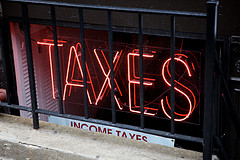Tax Collectors Using The Power Of Peer Pressure To Get People To Pay Delinquent Taxes
Peer pressure can work wonders when it comes to convincing us to buy certain products, dress a certain way or even decide to start cooking kale even though we don’t totally get it. But taxation experts are hoping it will also do the trick to encourage people to pay up on their delinquent taxes. And maybe start wearing friendship bracelets to show how cool they are.
Behavioral economists are all in favor of this peer pressure plan, and many tax agencies are starting to find ways to use certain methods in tax collecting. It seems to be working — whether it’s just re-wording late notices or tweaking payment plans, reports Reuters. It might not be that hard, either, since we already kinda want to do what everyone else is doing.
“People forget the basis of our system is voluntary compliance,” one specialist in taxation told Reuters. “The vast majority of people want to do the right thing. If government can make it easier to understand what that is, it can have a big impact.”
In what sounds like a pretty interesting job, behavioral economists take into account social and emotional factors and use psychology to study why we do what we do with our finances. Those experts say that we shouldn’t necessarily assume that consumers do things just to further our own agendas. So while penalizing people to ensure compliance is still part of the compliance plan, there are other strategies that can help and aren’t so negative.
Over in ye olde England Her Majesty’s Revenue and Customs agency is taking the peer pressure angle in different form letters, using sentences like “Nine out of 10 people in the UK pay their tax on time” and adding “You are one of the few who have not paid us yet.”
Other tactics include just using regular old English in tax forms, based on the thought that we only focus on what we can understand. So if you’re being taxed up the whatsit and don’t really get why, you might be more likely to avoid paying.
Along those lines, the Washington State Department of Revenue rewrote its form letter and had an uptick in positive responses. The state also reworded its tax amnesty program in words people can actually understand, which pulled in $321 million in new tax revenue for Washington State. Not too shabby!
So pay your taxes, people. After all, all your friends are doing it and you wouldn’t want to be excluded in the fun.
Behavioral economics taps power of persuasion for tax compliance [Reuters]
Want more consumer news? Visit our parent organization, Consumer Reports, for the latest on scams, recalls, and other consumer issues.


